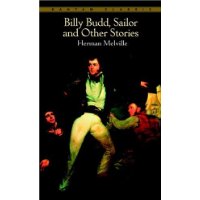| 商家名称 |
信用等级 |
购买信息 |
订购本书 |
|
|
 |
Billy Budd, Sailor & Other Stories |
 |
|
 |
Billy Budd, Sailor & Other Stories |
 |

基本信息·出版社:Bantam Classics
·页码:278 页
·出版日期:1982年05月
·ISBN:0553212745
·条形码:9780553212747
·装帧:简装
·丛书名:Bantam Classic
·外文书名:比利巴德, 水手和其他故事
内容简介 在线阅读本书
If Melville had never written
Moby Dick, his place in world literature would be assured by his short tales. "Billy Budd, Sailor," his last work, is the masterpiece in which he delivers the final summation in his "quarrel with God." It is a brilliant study of the tragic clash between social authority and individual freedom, human justice and abstract good. Melville also explores this theme in "Bartelby the Scrivener," his famous story about a Wall Street law clerk who takes passive resistance to a comic—and ultimately disastrous—extreme; and in "Benito Cereno," his dazzling account of oppression and rebellion on a nineteenth-century slave ship. Completing this collection of great tales are the eerie "The Encantados," the beautiful, romantic "The Piazza," and Melville's chilling science fiction parable, "The Bell-Tower."
作者简介 Herman Melville was born in New York City in 1819. When his father died, he was forced to leave school and find work. After passing through some minor clerical jobs, the eighteen-year-old young man shipped out to sea, first on a short cargo trip, then, at twenty-one, on a three-year South Sea whaling venture. From the experiences accumulated on this voyage would come the material for his early books,
Typee (1846) and
Omoo (1847), as well as for such masterpieces as
Moby-Dick (1851),
Pierre (1852),
The Piazza Tales (1856) and
Billy Budd, Sailor (posthumous, 1924).
Though the first two novels—popular romantic adventures—sold well, Melville's more serious writing failed to attract a large audience, perhaps because it attacked the current philosophy of transcendentalism and its espoused "self-reliance." (As he made clear in the savagely comic The
Confidence Man, 1857), Melville thought very little of Emersonian philosophy. He spent his later years working as a customs inspector on the New York docks, writing only poems comprising
Battle-Pieces (1866). He died in 1891, leaving
BILLY BUDD, Sailor, unpublished.




